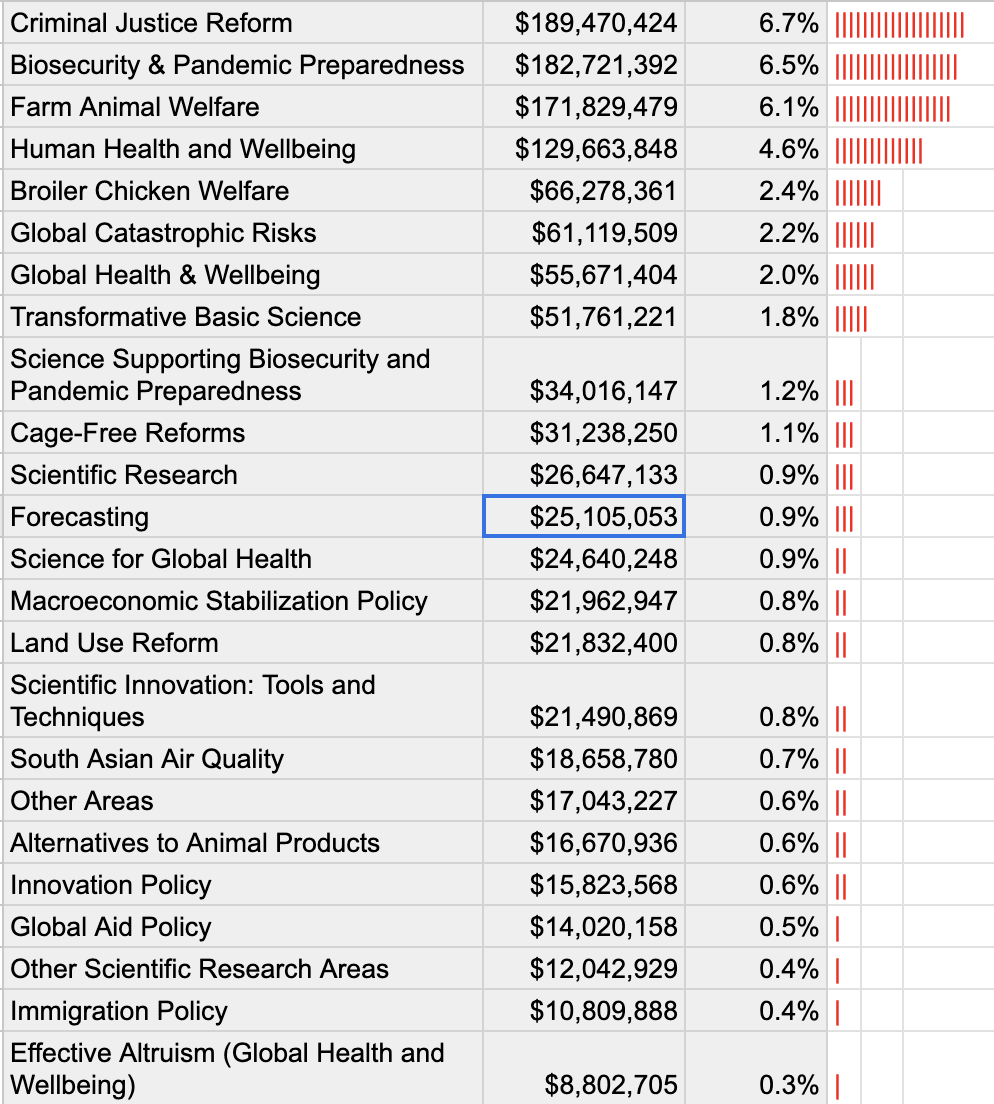Written by Benjamin Tereick
Edit: several comments here question the value of forecasting as a philanthropic cause — see this comment for a reply.
We are happy to announce that we have added forecasting as an official grantmaking focus area. As of January 2024, the forecasting team comprises two full-time employees: myself and Javier Prieto. In August 2023, I joined Open Phil to lead our forecasting grantmaking and internal processes. Prior to that, I worked on forecasts of existential risk and the long-term future at the Global Priorities Institute. Javier recently joined the forecasting team in a full-time capacity from Luke Muehlhauser’s AI governance team, which was previously responsible for our forecasting grantmaking.
While we are just now launching a dedicated cause area, Open Phil has long endorsed forecasting as an important way of improving the epistemic foundations of our decisions and the decisions of others. We have made several grants to support the forecasting community in the last few years, e.g., to Metaculus, the Forecasting Research Institute, and ARLIS. Moreover, since the launch of Open Phil, grantmakers have often made predictions about core outcomes for grants they approve.
Now with increased staff capacity, the forecasting team wants to build on this work. Our main goal is to help realize the promise of forecasting as a way to improve high-stakes decisions, as outlined in our focus area description. We are excited both about projects aiming to increase the adoption rate of forecasting as a tool by relevant decision-makers, and about projects that provide accurate forecasts on questions that could plausibly influence the choices of these decision-makers. We are interested in such work across both of our portfolios: Global Health and Wellbeing and Global Catastrophic Risks. [1]
We are as of yet uncertain about the most promising type of project in the forecasting focus area, and we will likely fund a variety of different approaches. We will also continue our commitment to forecasting research and to the general support of the forecasting community, as we consider both to be prerequisites for high-impact forecasting. Supported by other Open Phil researchers, we plan to continue exploring the most plausible theories of change for forecasting. I aim to regularly update the forecasting community on the development of our thinking.
Besides grantmaking, the forecasting team is also responsible for Open Phil’s internal forecasting processes, and for managing forecasting services for Open Phil staff. This part of our work will be less public, but we will occasionally publish insights from our own processes, like Javier’s 2022 report on the accuracy of our internal forecasts.
- ^
It should be noted that administratively, the forecasting team is part of the Global Catastrophic Risks portfolio, and historically, our forecasting work has had closer links to that part of the organization.


Thanks Ozzie for sharing your thoughts!
A few things I want to clarify up front:
Thoughts on some of your bullet points:
I was trying to compare previous OP forecasting funding to previous AI Safety. It's not clear to me how different these were; sure, OP didn't have a forecasting program but AI safety was also very short-staffed. And re: the field maturing idk Tetlock has been doing work on this for a long time, my impression is that AI safety also had very little effort going into it until like mid-late 2010s. I agree that funding of potentially promising exploratory approaches is good though.
Seems reasonable. I did like that post!
Perhaps, but I think you gain a ton of info from actually trying to do stuff and iterating. I think prioritization work can sometimes seem more intuitively great than it ends up being, relative to the iteration strategy.
I would love for this to be true! Am open to changing mind based on a compelling analysis.
There might be some difference in perceptions of the direct EV of marginal AI Safety interventions. There might also be differences in beliefs in the value of (a) prioritization research vs. (b) trying things out and iterating, as described above (perhaps we disagree on absolute value of both (a) and (b)).
Seems reasonable, though I'd guess we have different views on which ambitious AI-related software-heavy projects.
I think you might be understating how fungible OpenPhil's efforts are between AI safety (particularly governance team) and forecasting. Happy to chat in DM if you disagree. Otherwise reasonable point, though you'd ofc still have to do the math to make sure the forecasting program is worth it.
(edit: actually maybe the disagreement is still in the relative value of the work, depending on what you mean by "much" grantmaking capacity)
Seems unclear what should count as internal research for EA, e.g. are you counting OP worldview investigation team / AI strategy research in general? And re: AI advancements, it both improves the promise of AI for forecasting/epistemics work but also shortens timelines which points toward direct AI safety technical/gov work.